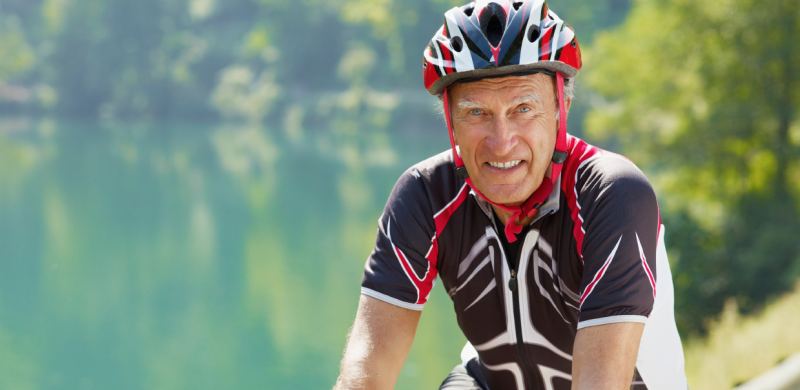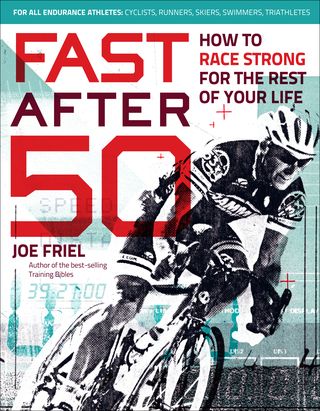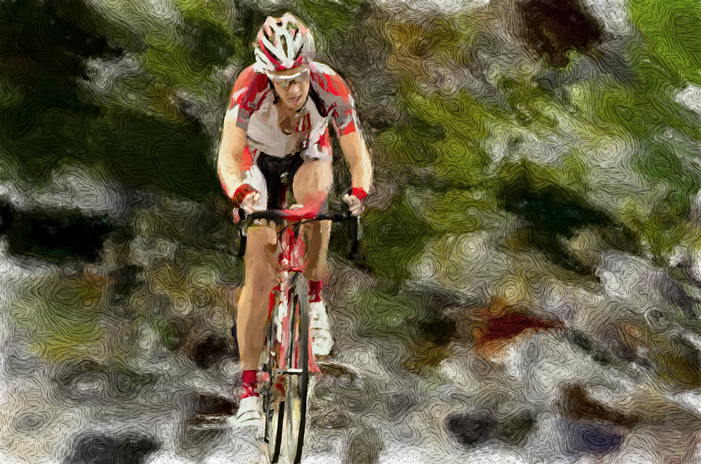
I’ve been following Joe Friel’s Blog for a while now and it’s always interesting. His recent book is FAST AFTER 50 and it’s a topic that might interest many of us. For more on Joe you can visit his site here: www.TrainingPeaks.com.
By now you may be aware of my latest book—Fast After 50—being in print. In February it will also be ready to go as an ebook. This project started out as a birthday present to myself. I was approaching my 70th birthday and that number was scary for some reason. I was afraid of rapidly decreasing athletic performance. So I decided to read all of the research I could find on aging and endurance. There was a ton of it. For the next eight months I read research studies almost daily while taking detailed notes. From that I decided to post what I was learning to this blog (search “aging” here to find the various posts—more than 20 of them!). The blog posts were so well-received that I knew I had to write a book about what I was learning.
The following is an overview to the book. Should you decide to read the book I hope you learn something that proves helpful. I also hope you’ll contact me and let me know how the lessons here are working for you. I’ve gotten several such emails recently and really appreciate them. Thanks!
So here’s what the Fast After 50 is about…
Here I start by telling you the answer to the question that is the underlying theme of the book: Why am I getting slower and what can I do about it? And I get into why I used so much research, rather than simply my opinions, to write this book.
Chapter 1 The Aging Myth
The overriding purpose of this chapter is to come face to face with the aging process by understanding exactly what aging is and also by looking at what the best age group athletes in the world have accomplished in their sports. We also take a look at how “normal” aging differs from athletic aging. The big question here is, How much should one expect to slow down with advancing age?
Chapter 2 The Ageless Athlete
This chapter is about exercise as “medicine.” I get into the common and popular theories of aging so you get a historical perspective of how your advanced age has been explained over time. And I examine some of the physiological markers of longevity, such as telomeres and stem cells, and how exercise alters them—for the better.
Chapter 3 Over the Hill
What’s standing between you and being a fast athlete once again? The challenge is by no means small and requires both dedication and discipline. It won’t be easy, especially at first when your training and lifestyle begin to change. And we’ll dig into lifestyle as a determiner of what your future may look like. That brings us to the twin roles of nature and nurture. You’ll probably be surprised at what aging experts are now coming to believe is the more responsible of these two for how one lives out their life. You’ll come to understand why society at large is doing so poorly in this regard—all of them except you, that is, because you stay focused on what makes you faster. As it turns out, it’s also the stuff that gives you a long and healthy life.
Chapter 4 The High-Performance Senior Athlete
Now the tables begin to be turned. We move away from the downsides of aging and begin looking at what it will take to slow the effect of age on performance or, even perhaps, temporarily reverse it. The objective is to become not only fast but also faster. Here we look at how to once again determine your potential as an athlete, only now an older one. And we start digging into training in order to turn the tide of slowing performance. It all starts with the intensity of your workouts. Surprised?
Chapter 5 Training Basics
But intensity has downsides! I don’t want any injuries or overtraining! Calm down. We’re going to talk now about what stress is in training and why it can cause injuries and overtraining—and, more importantly, how to prevent that from happening. It mostly comes down to greed. We try to get too much too fast. Field testing is suggested to determine exactly where you are right now as an endurance athlete and point you toward faster racing in the future.
Chapter 6 Advanced Training
Now we’re into the heart of the book—how to train as an older athlete. We’ll dig into two of the greatest determiners of performance with aging—aerobic capacity and muscle mass. In this chapter you’ll read about how you can reverse the decline you are undoubtedly experiencing in both of these. Here you will come up with a personalized weekly training routine (I suggest one that is rather novel) to get you back to advanced training once again. Workout types, regardless of your endurance sport, and periodization are described.
Chapter 7 Rest and Recovery
In Chapter 6 you learned about how to train—except for one thing: how to recover. This, in many ways, is the critical concern for the aging athlete as we tend to recover slowly. Here I’ll tell you about such stuff as fatigue (what is it?), sleep (how to improve it), hormones (how to produce more) and nutrition (what the research suggests for older athletes). We also go into a whole host of alternative recovery aids.
Chapter 8 Body Fat
This is the chapter that scares everyone. Nobody likes to talk about body fat—including me. Why do we get more of it, and mostly in certain places, as we get older? Again, the hormone thing! We haven’t got enough and we need more to keep our bellies under control. What can we do about it? Menopause also shows up here. By the end I hope you have a handle (not a “love handle”) on how to combat increasing fat with aging.
Epilogue
Besides summarizing the main lessons of the book, I get into the personal challenges I faced in implementing them. I certainly hope you don’t experience what I did while in the process of writing this book. 2014 turned out to be a doozy of a year and, as a result, I’ve only gotten back on my Fast After 50 training regimen in the last few months. I explain all of this here.
I end the book by thanking the many senior athletes I’ve coached over the past thirty-some years. Amazing people! I remain in awe of how good they are as athletes. The journey for me continues with them as role models.







